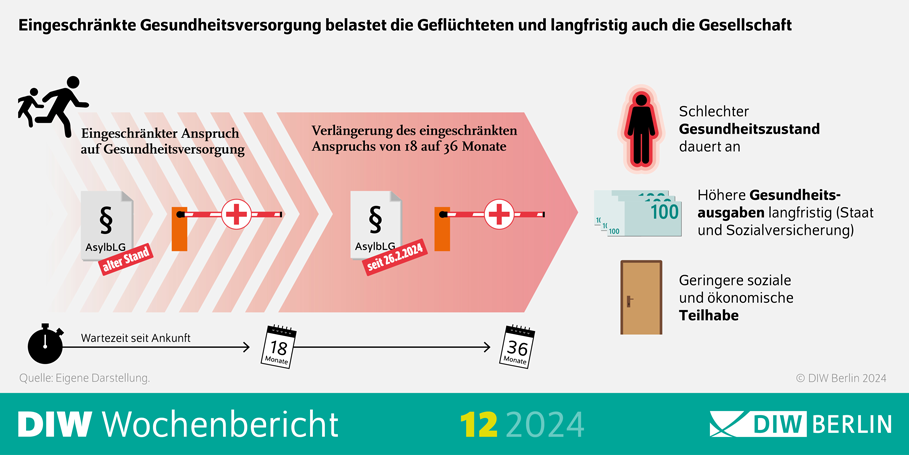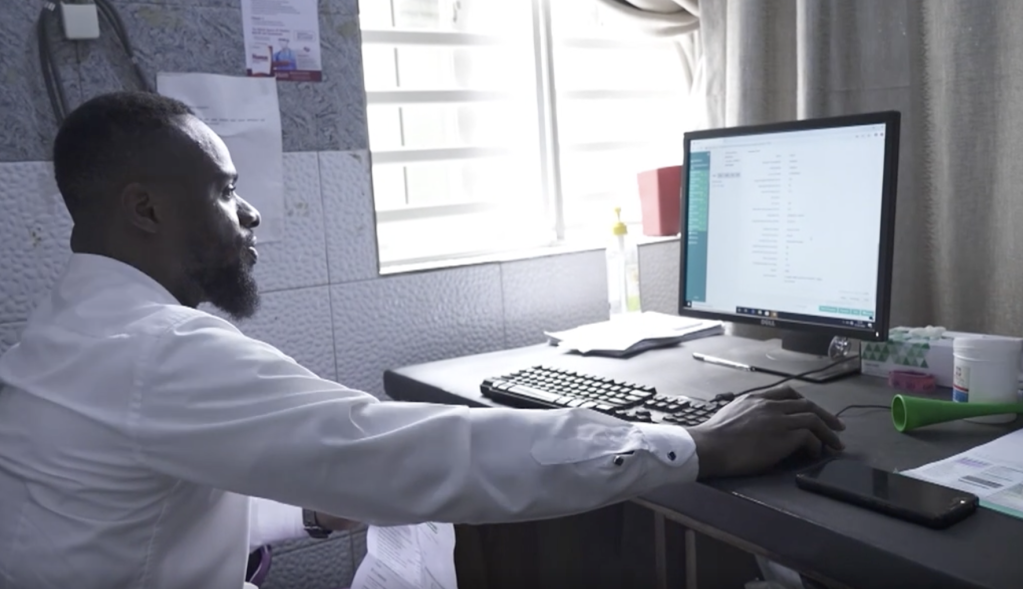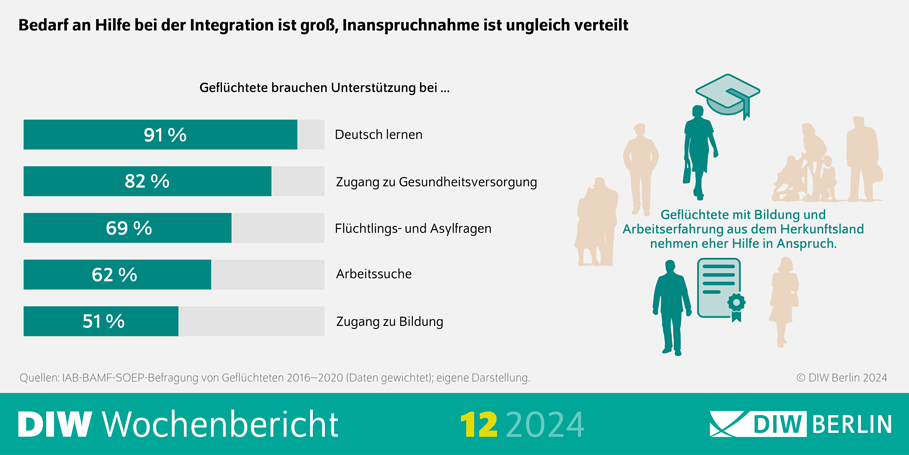A study, from the German Institute for Economic Research (DIW), has found that new laws imposing longer waits before asylum seekers receive health benefits is unlikely to reduce the costs to society.
Under new German laws, brought in at the end of February, the waiting time for asylum seekers to receive full health benefits has increased from around 18 months to up to 36 months.
Part of the motivation behind the laws is to reduce the attractivity of Germany to potential asylum seekers and not offer all the benefits to someone before they might have had the opportunity to pay into the mutual public health system.
However, a new study from the German Institute for Economic Research (Deutsches Institut für Wirtschaftsforschung -- DIW), released on March 20, found that this extra waiting time will not help reduce the costs to society.
In fact, as illustrated by the below graphic, the study found that if migrants were left with worse levels of general health, due to lack of access to the right care, it would cost society more in the long run in terms of health and welfare benefits, and would lead to fewer social and economic participants from the migrant community in German society.

"The sooner health problems are addressed the better," explained one of the study authors Louise Biddle. "Leaving tackling a health problem, whether that is a chronic condition, or an emergency normally ends up costing more than early treatment," reported the news agency Reuters.
New laws
Biddle thinks that trying to cut down on the costs of health care to asylum seekers, by making them wait longer before they are allowed to access the full range of benefits, "will not reduce the costs to German states and municipalities."
The new laws mean that asylum seekers only receive treatment for acute illnesses, pain, or pregnancy during the initial 36 months of their stay in Germany. Further treatment is then left to the discretion of the doctors or social welfare offices that provide the benefits.
The laws were voted in last November by cross-party support. The opposition conservative CDU-CSU factions were particularly in favor of lengthening the waiting time for health benefits, in order, they claimed, to save money.
Last year, opposition leader Friedrich Merz (CDU) said on a German TV-talkshow that he believed some migrants were coming to Germany in order to benefit from German welfare provision. In a much-criticized contribution to the program, Merz said that some migrants were coming to Germany "to get their teeth done."
Germany, like many other developed countries is suffering from the combined effects of the financial crisis the Corona pandemic, the war in Ukraine and various other huge drains on state funding. Many Germans, especially in big cities like Berlin or Munich, complain of the cost of living and the long waiting times for them to see doctors and dentists.
Scapegoating migrants for Germany's woes
Some politicians, like Merz and the far-right AFD party have directly or indirectly appeared to blame some of these ills on the increase in migrants in the country since 2015. Implying that when money is tight Germans should be first in line to receive all the benefits they are due.
According to the DIW study, what actually might help save money would be the introduction of an electronic health card, which is already in operation in six German states. In the other states that have not yet introduced the card, asylum seekers must apply at the social welfare office for a document that entitles them to be seen by a doctor.

DIW said that Hamburg, one of the German city-states to have introduced the electronic cards, was able to save 1.6 million euros annually.
Also read: Germany, chance of obtaining asylum varies by region
With the old system, minus the electronic cards, says study author Biddle, "there is a huge amount of administrative bureaucracy, it delays the treatment, and both patients and doctors find it a cumbersome process."
More help needed
The DIW study found that many migrants and asylum seekers not only have to wait longer to see a doctor, but they also need more support when they finally get an appointment.
The graphic below illustrates the findings of a second study which examined how much help migrants, asylum seekers and refugees might need accessing health care, (Zugang zu Gesundheitsversorgung) asking about their asylum process (Flüchtlings- und Asylfragen), learning the German language (Deutsch lernen), looking for work (Arbeitssuche) and access to education and training (Zugang zu Bildung).
The study found that 98 percent of migrants, asylum seekers and refugees needed help in at least one of these areas. 21 percent in all five of the areas. The biggest area of need, the study found, was for learning German. In fact, 91 percent of those questioned in the study said they needed help to learn German.

82 percent of those asked said they would need help accessing medical care. Despite the expressed desire for help, many migrants, asylum seekers and refugees say they do not receive it. About 40 percent of those questioned said they would need help looking for a job but had not accessed any help. 34 percent said they would like help to deal with the asylum process but had not been offered any.
Education helps to access help and support
Migrants with training and education in their home countries often did manage to access help and support to find out how they might be able to translate that experience into something the German economy would be looking for; but those without any formal education or training often said they had been left alone.
Another of the study authors, Ellen Heidinger, commented that "this kind of help should not depend on whether or not someone has a certain level of education or degree," as stated in the press release from the DIW.
The DIW recommends that more mentorship programs should be started to help people find their place in society, and that information about work and how to go about getting it should be more readily available to everyone.
How did migrants arrive in Germany?
A third study by the DIW found that the majority of migrants arriving in Germany between 2014 and 2023 came over two main routes: 35 percent of them arrived via the eastern Mediterranean route and 33 percent took the land route through the Western Balkans.
Almost half of those asked said they had "negative experiences" during their journey towards Germany. 24 percent of those asked cited being cheated as one of the worst parts of their journey, around 18 percent said that being imprisoned or beaten had been the worst part of their journey. However, around half of those asked didn’t want to go into details at all.

Another of the study's authors, Professor Dr. Cornelia Kristen, from the University of Bamberg, and a Senior Research Fellow at DIW Berlin, said that women especially often didn’t want to go into details about their journey. But they did need help because of what might have happened to them along the way.
She added that if all regions in Germany were to introduce the electronic health card, it would lead to "greater transparency" across the entire system. Kristen said that the current system was untransparent and quite hard to navigate, which led to differences in treatment for some people just because of their ability to navigate, or the differing decisions made by different health authorities.
An electronic card, Kristen felt, would help because it could contain information about all the medicines and treatments that are allowed based on the status of an asylum seeker. This would make the whole process clearer for patients and doctors.
